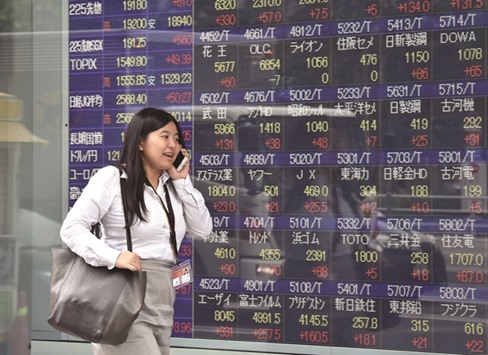Asian markets mostly bounced back yesterday from the previous day’s hefty sell-off, on hopes Donald Trump can push through his economy-boosting agenda despite last week’s healthcare debacle.
However, with expectations about the rate of future US interest rate rises receding, the dollar is struggling to break back against its major peers.
Markets across the world tumbled after the tycoon’s repeal of Obamacare fell at the first hurdle on Friday as he failed to garner enough votes from his own Republican party, which controls both houses of Congress.
The failure fuelled worries Trump would not be able to drive his much-vaunted tax-cutting, infrastructure spending, deregulation plans, with analysts pointing out it would leave the administration with less cash to pay for such measures.
Hopes for his stimulus plan helped fuel a surge in global markets and in the dollar since the November election.
While New York and European markets ended on a low, they were well off their early losses and provided Asian traders with something to play with as the dust settles after Trump’s bruising defeat.
“What seems to be going on in US stocks is that President Trump is being given the benefit of the doubt that he will be able to deliver on tax and infrastructure,” said Greg McKenna, chief market strategist at AxiTrader.
Tokyo ended 1.1% higher, having slumped 1.4% on Monday.
Hong Kong added 0.6% and Sydney rallied 1.3%, while Seoul put on 0.4%, Singapore 0.8% and Manila 1.2%. However, Shanghai fell 0.4%.
“On balance the underpinnings are strong enough that we want to stay long” on stocks, Ted Weisberg, president at New York brokerage Seaport Securities, told Bloomberg TV.”We are viewing any kind of selloff as a buying opportunity.”
However, while equities picked up, the dollar remained subdued, sitting at four-month lows against the yen.
The euro has been buoyed by upbeat data out of the eurozone.
Weighing on the greenback were comments from the head of the Chicago branch of the Federal Reserve Charles Evans that it might only need to raise borrowing costs twice this year considering an uncertain outlook for inflation and Trump’s big-spending and tax-cutting agenda.
The yen has climbed more than 7% against the dollar since the start of the year while the single currency is up about 5%. Even the pound, which was battered last year by Britain’s vote to leave the European Union, has risen 5% from its January lows.
The US unit had already been under pressure after Fed boss Janet Yellen said this month that the pace of rate rises would be slower than initially expected.
“The market will be...interested — or hoping (vainly) for new insights from Fed Chair Yellen’s address” later, said David de Garis, director of fixed income, currencies and commodities at National Australia Bank, in a commentary.
In Tokyo, the Nikkei 225 closed up 1.1% to 19,202.87 points; Hong Kong — Hang Seng rose 0.6% to 24,345.87 points and Shanghai — Composite closed down 0.4% to 3,252.95 points at the close yesterday.

A woman passes before a share prices board in Tokyo. The Nikkei 225 closed up 1.1% to 19,202.87 points yesterday.
